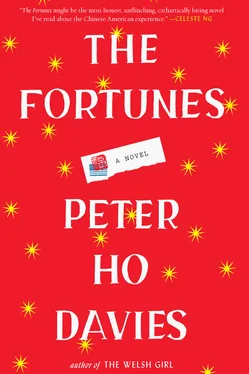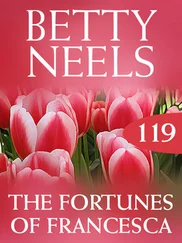“Well,” she offered waspishly, “I see they won’t be needing me no more. Nor the puss to catch the mice, so!”
Bridey was the girl he was replacing, a trade, she gave him to understand, that was greatly, pitiably, to the Crockers’ disadvantage (her contempt for Ling was merely the long shadow of her starchy resentment against her employers). Bridey shared the bristling umbrage of many Irish girls toward the Chinese who were displacing them from work, but in her case the general animus was tempered by her own good fortune. She was to be married and had given her notice, hence a place had opened. So fluffed up was she with her nuptial prospects that Ling at first took “Bridey” to be her title and not her name. She looked down on him from this lofty matrimonial height but also took a kind of glee in lumbering the Crockers with him, though — as Ling would come to know — they were just as delighted to see the back of her, such were the liberties she’d taken: refusing to do laundry “as scullion work” and entertaining her “cousin”-cum-beau, Sean, a beanpole of a boy seemingly always on the verge of toppling, in the kitchen and at the Crockers’ expense. “I’m not no nagur, nor no Chink neither, to take orders,” the girl had declared roundly to Sean on one of his visits while she was teaching Ling to cook (he took to it swiftly, since most everything in Bridey’s economy, from eggs to cabbage to potatoes to meat, was to be boiled like so much laundry, and anything else fried with fatback). She huffed on a silver spoon she was polishing, rubbed it on her sleeve, and studied her reflection in it. “I’m as white as ’em, ain’t I?”
Bridey had shown Ling where to find the buckets and brushes and brooms. Shown him where to dispose of the chamberpots and how to make the beds so tight that a coin would bounce on them (she caught the coin), and even how to do the laundry, despite his assurances that he knew. She’d begun to show him how to iron — pummeling rather than smoothing the linen as if into submission — until he’d taken over impatiently and she’d nodded. “Well, I never. They do say your sort pick up a thing right quick.” Though to his surprise, she’d later set a newspaper on the ironing board and given it a brisk pressing. It was to become one of his preferred tasks (once he remembered not to spit on it), poring over the headlines as he ironed in an effort to parse out new English words before carrying the paper in to breakfast. He got a second chance to practice his reading later, while ripping the old pages into strips to serve in the privy.
Bridey had sailed out of the house a week after Ling arrived, Sean meeting her at the garden gate, doffing his hat so low that Ling feared he might snap in two like a reed.
“She might have been a papist, that one, but her staunchest faith was in manifest domesticity,” Crocker had grumbled after her departure. “Let the Fenians have their home rule, by all means, just not in my home!”
It was more women’s work, but Ling felt a modest thrill in knowing that he was preferred to a white woman. That might have seemed like faint praise, to be the lesser (and cheaper) of two evils — on his arrival he’d overheard Crocker murmur to his wife, “The best difference between your Chink and your Cat-lick is that one doesn’t have enough English to back-talk” (indeed, it had taken Ling a moment to gather that Crocker meant Catholic ) — except that on his second day, trussed into an apron, duster in hand, Bridey had shown him into the parlor, her braying voice falling to a hush in the presence of such polished solidity, while Ling had found himself, as if transported, at home. The Crockers, he saw, were followers of the modish fad for chinoiserie: rosewood furniture and tall silk screens filled the room, which was dominated by an ornately carved altar. Big Uncle had a much smaller though still sumptuous altar in his cabin on the flower boat, a shrine on which to burn incense and leave offerings of fruit to the ancestors and before which the old gangster would bow, as he did before no living man. The Crockers’ was used as a breakfront of sorts, displaying ornaments and silverware, the only venerable dead on show vases of dried flowers and a stuffed songbird in a vitrine. And yet something of the altar’s dignity clung to it. To Ling it suggested the value the Crockers put on things Chinese, and he felt touched, if also a little homesick, as if he had been “collected” in the same spirit of connoisseurship, as if he too might be polished to a high gloss in their home (even if he did the polishing himself).
When he took the job — not that Crocker’s vast certainty had allowed any room to decline it, in retrospect — Ling told himself it would be temporary. He was still bound for the mother lode to make his fortune. Yet after three months, when he had enough to buy a pan and even a burro, he closed his fist around the money. He knew all about a Chinaman’s chance in the goldfields — as thin and wispy as a lucky hair — from Uncle Ng. But around Crocker he saw how even ghosts were disappointed, drifting back to town hungry and hollow-eyed, the only gold on them their rotted teeth. Crocker liked to watch such wrecks from his office, men he’d once outfitted at his store, their ragged clothes faded to the color of the dust in the street hanging loose around them. “One in a thousand strikes it rich,” Crocker told him when Ling shyly revealed his own plans. “But every man jack needs a shovel, a winter coat, good boots. You’ve heard of fool’s gold — pyrites?” Ling nodded. “Here’s the secret, son: it’s all fool’s gold.”
And so Ling had stayed, struck by how much his new employer sounded like his last. He didn’t like being called a fool — though he felt a strange shiver when Crocker called him son —and suspected that Crocker simply didn’t want to trouble himself with finding another new servant, but it had already occurred to him that Mister Charley might be the next best thing to gold. He knew from the way Crocker’s chest swelled tautly at the sight of the defeated that the man had his own designs on striking it rich. Once, he’d grasped Ling’s arm and pointed out the wagon ruts crisscrossing the dusty street: “Someday there’ll be rail lines covering this whole land like that.” And then who knew what wealth might not roll down the mountain?
Without a room to rent or food to buy, and even discounting what he spent on Little Sister (for he continued to visit her weekly), Ling was able for the first time to send money home, hoping that by making good on his vow to Big Uncle he might negate Ng’s claim. Even if it was true, he thought the old gangster might yet embrace him if he proved his worth. He found a round-shouldered scribe in Chinatown to write a letter for him. Something, though, warned him not to confess his new line of work; he had promised Big Uncle to make his fortune in gold, not as a servant. They knew about servants at home, it turned out. Her sons all had them now, Aunty Bao wrote back gaily, and then complained about one in particular, Ah Poy, his insolence, his laziness. Never mind being a son; by the time he’d read her letter over, Ling felt stung, not to be a servant but that he might be a bad one. He redoubled his efforts at work, and only occasionally as he held a frock coat for Crocker, or knelt to button his boots, or bowed to fasten the fob of his watch (an action that felt like chaining a gate against a herd) did he feel as if he were serving his family.
They couldn’t notice such efforts, of course, but Crocker did.
Six months after he’d hired Ling, Crocker had fallen into a black mood, his railroad enterprise stalled, the tracks not much farther than the outskirts of town. Part of Crocker’s disdain for the failed miners was that they made such lousy workers. He’d hire them on at the start of the month, and by the end half of them would have defected, riding the rails to the end of the line for free and then lighting out for the diggings again. “And those that don’t spend their wage on new rigs spend it on drink, so that I’m left with the worser half!” he thundered. Now these fellows had had the temerity to demand a pay raise.
Читать дальше












